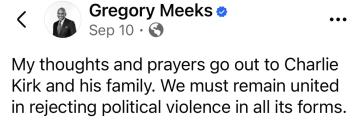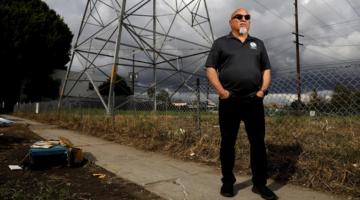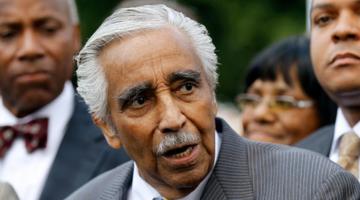As the late Glen Ford said, the Black misleadership class has no shame. Congresswoman Karen Bass's campaign for mayor of Los Angeles is full of empty promises. She proposes nothing that would actually address the needs of that city's unhoused population.
Last week, in Congresswoman Karen Bass and The Will to Intervene, I reviewed Karen Bass’s foreign policy as California’s 37th District Congresswoman, Chair of the House Foreign Relations Committee’s Subcommittee on Africa, and Vice Chair of the National Endowment for Democracy.
Bass will be leaving Congress soon because she chose to run for mayor in Los Angeles instead of running for her Congressional seat again. Her opponent, billionaire developer Rick Caruso, spent $41 million to her $3.28 million and still came in second in the June primary. She had a 6% lead over him by mid-June.
As I said last week, I’m not writing to encourage Angelenos to vote one way or another, just writing so that we can better understand the Congresswoman who will likely be the next Mayor of Los Angeles.
After Black Agenda Report published my piece last week, several people told me that Bass’s arch imperialist foreign policy positions have nothing to do with what sort of mayor she might be, but I disagree. Like all the House Democrats, she just voted to throw another $40 billion into the US proxy war in Ukraine, and she has consistently voted in favor of the National Defense Authorization Act, aka military budget, which is now close to $800 billion annually (prior to special appropriations). No one who casts such votes should be taken too seriously when they promise to pressure the federal government to allocate more funds for domestic emergencies, as Karen Bass does.
The same can be said of most every Congressperson in Washington, but it still needs saying.
Karen Bass and LA’s homelessness crisis
Bass and Caruso are both running on homelessness and crime, with the former in the lead. Looking at her platform on her primary issue says a lot about what kind of mayor she’ll be.
In January 2019, Los Angeles County had 58,936 people experiencing homelessness, but by January 2020, the number rose to 66,433, a 12.7% increase. The City of Los Angeles counted 36,165 in 2019 and 41,290 in 2020, a 14.2% increase. According to the federal Department of Housing and Urban Development, LA had the highest rate of homelessness in the country in 2020. According to Karen Bass’s campaign website, four people are dying on the streets every day, but some estimates are higher.
People who identify as Black or African American are only 8.1% of the LA’s population, but they are 38% of its homeless population. Sixty percent of its homeless population are formerly incarcerated.
LA County skipped the annual homeless census in 2021 for fear that it would spread COVID-19. Given the anger and stress now being reported about the crisis, this year’s as yet unreported statistics may well be worse than 2020’s, despite hundreds of millions of taxpayers’ money thrown at the problem. There are more and more reports of hostility between housed and unhoused residents, including vigilante violence against the homeless.
Karen Bass said she was going home to run for mayor because the house is on fire, but what will she do?
While short listed to be Joe Biden’s 2020 running mate, Bass felt compelled to tell NBC, “I am not a socialist. I am not a communist.” We can’t expect her to propose any serious challenge to property rights or to the developers who drive LA’s politics as much as they do in most major cities.
Like all Democratic and Republican politicians, she looks at the homeless, not the system that created the homeless, as the problem.
As a former social worker, physician’s assistant, and community organizer, Bass might arguably be a bit more compassionate than the billionaire developer, but her response to homelessness can be no more than palliative at best. She and any other politicians who talk about their “solutions” to homelessness without talking about its real causes are just grandstanding.
Let’s take a look at several of her proposals nevertheless:
Marshall the Resources of the Federal, State, County, and City Governments Around a Single Plan
Does she really think she can create political will in government that hasn’t existed since Ronald Reagan threw people out on the streets in the 1980s? Can she overcome the corruption that favors for-profit developers at every level of government, corruption manifest over and over in zoning and city contracting? And in “public private partnerships,” meaning public subsidies of private, for-profit corporations?
By voting for the $800 billion military budget and for shoveling another $40 billion into the Ukraine War, she reinforced the overwhelming military industrial corruption that makes the entire US a dystopia, so how much corruption-fighting can Angelenos expect of her?
House 15,000 People by the End of Year One and Build More Temporary, Affordable, and Permanent Supportive [Subsidized] Housing
It’s easy for temporary housing, like power plants with designated closure dates, to become permanent. There’s certainly an argument for temporary housing to get people off the streets, but will the development of temporary housing be driven by real concern for the homeless or by the hostility of those who don’t want to see them or have to deal with them any longer?
At worst, temporary housing can concentrate the homeless in ghettos, far from the central city, where they may be subjected to various forms of social control. I interviewed someone in LA who actually thought that LA’s homelessness crisis calls for a massive FEMA emergency response to move the homeless to the Antelope Valley. How far is that from a final solution?
As for affordable housing, it’s always been difficult to determine what “affordable housing” means, although “30 percent of your income” is the most often-used measure. That’s irrelevant to homeless people because the vast majority are unemployed.
If by affordable housing, Karen Bass means housing that prevents homelessness because more people can afford it, that’s a good idea, but for-profit developers can’t be expected to build it without huge public subsidies guaranteeing the same rate of return that they could earn building housing that’s not “affordable” or not even occupied because it’s more profitable sitting empty—as assets on corporate books—and even driving rents higher.
There are non-profit developers whose projects have been successful in various cities, but corruption-rife city governments are more likely to subsidize for-profit developers and make zoning decisions in their interest.
Are there any non-profit developers at work in LA, and if so, will Karen Bass have the power or the will to stand up for their model? She hasn’t expressed any interest in that possibility, and if she does, the for-profit developers will fight her like hell.
“Developer” is part of the lexicon in her platform, but “non-profit developer” is not, and that leaves little reason for optimism.
Transition Individuals From the Streets to Housing and Services, and End Street Encampments
Housing and Services are good ideas, but “ending street encampments” sounds like an eradication project. It can also mean ending whatever community the people in those encampments have managed to build. There’s a reason so many of the homeless gather together rather than pitching tents in isolation on this street or that. They become their own services for survival.
According to Steve Martinot, homeless organizer and former San Francisco State University professor, “Most homeless encampments are communities. People come together to protect one another. They work together to secure food from restaurants that would otherwise toss it. They cook, acquire portable toilets, and otherwise help each other out.“
The word “community” appears many times in Karen Bass’s plan to end homelessness, but not “homeless communities.” She talks instead about her experience as a community organizer, about “protecting the community at large,” and about “getting input from the community.”
Nowhere does she talk about serving the need for community that many encampments serve. Instead she talks about them as something we need to remove from the urban landscape.
Homelessness is the product of a class war between people and for-profit corporations, city governments who profit by serving them, and real estate investor-gentrifiers. It’s a war between human needs and the capitalist rationale to privatize and profit on everything existing. Democrats don’t acknowledge that any more than Republicans do, and Karen Bass is no exception.
LA is a Democratic Party town, but none of a long series of Democratic technocrats sitting in the mayor’s office have kept the homelessness crisis from getting worse. Karen Bass and Rick Caruso—who felt compelled to register as a Democrat to win—will nevertheless do a lot more grandstanding about it between now and November.
Ann Garrison is a Black Agenda Report Contributing Editor based in the San Francisco Bay Area. In 2014, she received the Victoire Ingabire Umuhoza Democracy and Peace Prize for her reporting on conflict in the African Great Lakes region. She can be reached at ann(at)anngarrison.com.



















